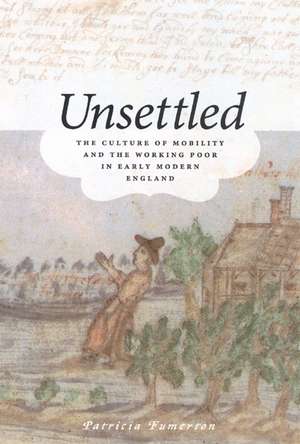Unsettled: The Culture of Mobility and the Working Poor in Early Modern England
Autor Patricia Fumertonen Limba Engleză Paperback – 11 mai 2006
Migrants made up a growing class of workers in late sixteenth- and seventeenth- century England. In fact, by 1650, half of England’s rural population consisted of homeless and itinerant laborers. Unsettled is an ambitious attempt to reconstruct the everyday lives of these dispossessed people. Patricia Fumerton offers an expansive portrait of unsettledness in early modern England that includes the homeless and housed alike.
Fumerton begins by building on recent studies of vagrancy, poverty, and servants, placing all in the light of a new domestic economy of mobility. She then looks at representations of the vagrant in a variety of pamphlets and literature of the period. Since seamen were a particularly large and prominent class of mobile wage-laborers in the seventeenth century, Fumerton turns to seamen generally and to an individual poor seaman as a case study of the unsettled subject: Edward Barlow (b. 1642) provides a rare opportunity to see how the laboring poor fashioned themselves, for he authored a journal of over 225,000 words and 147 pages of drawings. Barlow’s journal, studied extensively here for the first time, vividly charts what he himself termed his “unsettled mind” and the perpetual anxieties of England’s working and wayfaring poor. Ultimately, Fumerton explores representations of seamen as unsettled in the broadside ballads of Barlow’s time.
Fumerton begins by building on recent studies of vagrancy, poverty, and servants, placing all in the light of a new domestic economy of mobility. She then looks at representations of the vagrant in a variety of pamphlets and literature of the period. Since seamen were a particularly large and prominent class of mobile wage-laborers in the seventeenth century, Fumerton turns to seamen generally and to an individual poor seaman as a case study of the unsettled subject: Edward Barlow (b. 1642) provides a rare opportunity to see how the laboring poor fashioned themselves, for he authored a journal of over 225,000 words and 147 pages of drawings. Barlow’s journal, studied extensively here for the first time, vividly charts what he himself termed his “unsettled mind” and the perpetual anxieties of England’s working and wayfaring poor. Ultimately, Fumerton explores representations of seamen as unsettled in the broadside ballads of Barlow’s time.
Preț: 164.55 lei
Preț vechi: 200.45 lei
-18% Nou
Puncte Express: 247
Preț estimativ în valută:
31.49€ • 32.63$ • 26.28£
31.49€ • 32.63$ • 26.28£
Carte indisponibilă temporar
Doresc să fiu notificat când acest titlu va fi disponibil:
Se trimite...
Preluare comenzi: 021 569.72.76
Specificații
ISBN-13: 9780226269566
ISBN-10: 0226269566
Pagini: 288
Ilustrații: 34 halftones, 2 tables
Dimensiuni: 152 x 229 x 18 mm
Greutate: 0.43 kg
Ediția:1
Editura: University of Chicago Press
Colecția University of Chicago Press
ISBN-10: 0226269566
Pagini: 288
Ilustrații: 34 halftones, 2 tables
Dimensiuni: 152 x 229 x 18 mm
Greutate: 0.43 kg
Ediția:1
Editura: University of Chicago Press
Colecția University of Chicago Press
Notă biografică
Patricia Fumerton is professor of English at the University of California, Santa Barbara. She is the author of Cultural Aesthetics: Renaissance Literature and the Practice of Social Ornament and coeditor of Renaissance Culture and the Everyday.
Cuprins
List of Illustrations
Preface: Making Space for the Working Poor
Acknowledgments
A Note on the Text
Part 1 - Unsettled Subjects
1. Mobilizing the Poor
2. London's Economy of Unsettledness—and Beyond
3. Disguising the Working Poor: Harman's Caveat
4. Unsettled Subjectivity: The Virtual "I"
Part 2 - The Case of Edward Barlow
5. "Not Well Settled in My Mind"
6. Poor Men at Sea: "Never to be worth one groat afore a beggar"
7. Charting Barlow
Part 3 - Toward a Lowly Aesthetics of Unsettledness
8. The Ballad's Seaman: A Constant Parting
Epilogue: Unsettling the New Global Economy
Appendix A: Edward Barlow's Family Tree
Appendix B: Inventory of George Barlow, 1686
Appendix C: Record of Edward Barlow's Mobility (On Land and Sea)
Appendix D: Will of Edward Barlow, Commander of the Liampo, 1708
Appendix E: On the Variation of the Compass
Notes
Selected Bibliography
Index
Preface: Making Space for the Working Poor
Acknowledgments
A Note on the Text
Part 1 - Unsettled Subjects
1. Mobilizing the Poor
2. London's Economy of Unsettledness—and Beyond
3. Disguising the Working Poor: Harman's Caveat
4. Unsettled Subjectivity: The Virtual "I"
Part 2 - The Case of Edward Barlow
5. "Not Well Settled in My Mind"
6. Poor Men at Sea: "Never to be worth one groat afore a beggar"
7. Charting Barlow
Part 3 - Toward a Lowly Aesthetics of Unsettledness
8. The Ballad's Seaman: A Constant Parting
Epilogue: Unsettling the New Global Economy
Appendix A: Edward Barlow's Family Tree
Appendix B: Inventory of George Barlow, 1686
Appendix C: Record of Edward Barlow's Mobility (On Land and Sea)
Appendix D: Will of Edward Barlow, Commander of the Liampo, 1708
Appendix E: On the Variation of the Compass
Notes
Selected Bibliography
Index
